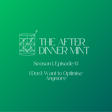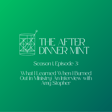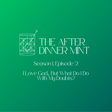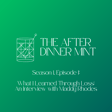
What I Learned When I Felt Like a Failure. An Interview with Sarah Burt
Thanks for listening to Season 1, Episode 3 of The After Dinner Mint, a podcast of Stories I’d Tell You at Dinner. Thanks for sharing your day with us!
We are interviewing all of our regular contributors in Season 1 of the podcast for you to get to know them better. Today’s guest is Sarah Burt, who lives on a farm in the Great Southern.
In today’s episode, we explore:
- The joys of amateur theatre and getting out into nature
- The slow process of coming to Christ from a secular family through friends, Christian Union, and God’s gentle leading.
- Sarah’s experiences of postnatal depression, what she learned about God’s character, and what helped her heal.
- Encouragement for those struggling with depression and for those struggling postpartum.
If you are struggling postpartum, you can contact the PANDA National Perinatal Mental Health Helpline, or with depression in different circumstances you can contact Life Line on 13 11 14.
You can also book an appointment with your GP for a Mental Health Care Plan. They can refer you for sessions with a psychologist or social worker under Medicare. If you’re in regional or remote Western Australia, these can even be done via telehealth.
Check out the show notes for everything mentioned in this episode.
Sign up to our free, weekly newsletter Stories I'd Tell You at Dinner to get honest stories from Christian women straight to your inbox on Wednesday. Never miss a thing - podcasts, essays, poems and fun events.


















